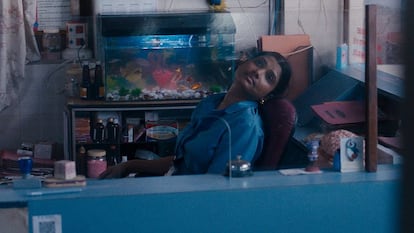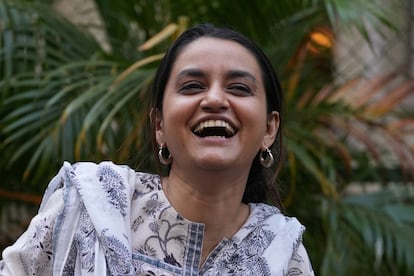When in May the Indian filmmaker Payal Kapadia (Mumbai, 39 years old), after winning the Grand Jury Prize in Cannes, the second most important award at the festival, predicted that the difficult part was yet to come—despite having been the first Indian film who had competed in the contest for 30 years—knew what he was referring to: “In Europe, female filmmakers battle for financing. I also suffer this process, but I also have to find a distributor in my country, ensure that my compatriots can see The light we imagine.” It doesn’t matter that he has won around twenty awards from American and European critics, that the magazine Sight & Sound has chosen it as the best film of the year or that this Sunday it competes at the Golden Globes in the sections for best direction and best film in a non-English language: in India The light we imagine She has had the industry against her, to the point that she was not her country’s representative at the Oscars. And it premiered earlier in New York and Los Angeles than in Kapadia’s hometown, where the plot also takes place.
However, Kapadia is 100% a product of Indian cinema. Although the author’s, far from the all-powerful Bollywood industry. Daughter of a psychoanalyst and a well-known painter, she studied directing at the Film and Television Institute of India, and worked for years as an assistant in audiovisual production. Its short Afternoon Clouds (2017) competed in Cannes; and in 2021 his first full-length, A Night of Knowing Nothing, about student life, won the award for best documentary at the same festival. With The light we imagine, released in Spain last Wednesday, it reached the competition of the French competition, something that no Indian director had ever achieved, nor any filmmaker from her country in the last 30 years. What would have been the pride of any other nation turned against Kapadia.
Why The light we imagine focuses on the friendship between two nurses, from Kerala, southwest India, who share accommodation in Bombay. The eldest, Prabha, misses her husband, who lives in Germany, and whom she married in an arranged marriage: they have not spoken in a year. Anu, younger, is having a secret romance with a Muslim. In addition to coping with her life doubts, Prabha tries to help Parvaty, a hospital cook who fights against a construction company that intends to demolish the block where she lives to build a skyscraper. Bombay, always present, appears as a city-character that absorbs and swallows the humanity of its inhabitants (12.5 million live in the center alone), a monster with, yes, a certain beauty.
The light we imagine It is a song to the unity of the people against power, as well as a reflection of the patriarchy and misogyny prevailing in India. In San Sebastián, where the drama was screened in the Perlak section, Kapadia pointed out to EL PAÍS: “Union gives me hope as an engine of change. I think it is more necessary than ever, even more so in countries like India, where a very small percentage of people own most of the economic resources.” Are its three protagonists the same woman at different ages? “Of course. I feel like a lot of times women are pitted against each other because of patriarchy, which gets in the way of female friendship. They make us criticize ourselves, and this happens a lot in India, where not all women support each other, probably because we have so internalized a patriarchy that provokes these reactions. In India you can be an economically independent woman, and yet your decisions are marked by sexist and traditional expectations.”
Kapadia has also erected a hymn to his chosen family: “I moved away from home and lived in a different place, my friends became my support system. They still are. Friendship is a relationship that is not really defined. It’s whatever you and your friend want it to be. It also works as a superior support system to the family, because blood family, at least in India, is quite oppressive.” And yet, the filmmaker asks not to close herself off from those who think otherwise: “The film is about accepting ideas or people that we don’t like or that are very different from us. We may not agree, but we have to find a way to listen to other people’s points of view.”

The original idea arose during his formative years – it was his final thesis – but he did not dare to undertake a production of that size. While debuting A Night of Knowing Nothing, Kapadia had temporarily moved to Europe, thanks to various aid, to find financing for The light we imagine. However, 100% of the filming was done in his country, with part of Indian money, and was divided into two stages: “From June to October is the monsoon season, with very heavy rains combined with 30 degrees, sun all day. time, really unpleasant moments to film… But I needed that feeling, so we shot 25 days during that time. Then I waited for the season to change. And in November we filmed another 15 days. In reality, we approached everything as guerrilla cinema, with little money. That is, a clear reflection of the living conditions in India, underlined in a style close to documentary: “I am interested in those formats. As in Cleo from 5 to 7 (by Agnès Varda), you don’t know when it’s a documentary, when it’s reality, when it’s fiction or if the character is dreaming. I am attracted to a new realism, that echo of fables, of popular tales. The documentary tone brings truth to fiction.”
Kapadia does not turn his back on the industry, despite the fact that his film even contains a sexual sequence, a rarity in Indian cinema, where censorship prevails. “Of course not, we are many auteur filmmakers. Furthermore, some circumstances pushed me to it. I did a lot of interviews in Bombay, with almost 150 women to act in the film, and almost all of them said to me: ‘So, do you want me to quit my job, which I’ve had for 20 years, and go shoot your film?’ Are you going to give me another job when we’re done?’ They were right. I am privileged, I understood what they told me, and I ended up hiring well-known performers from our cinema indie”.
Rejected to represent India at the Oscars
Since mid-September, it was rumored in the cinematographic gossip mills that The light we imagine would not represent India at the Oscars. The decision is made by the Film Federation of India (FFI), which brings together the owners of production companies, distributors and cinemas, and serves as an echo of the government in power, in this case, of Prime Minister Narendra Modi, leader of the BJP party, which defends a Hindu ethnonationalist ideology and, therefore, anti-Muslim. Films with public tax exemptions are released with cheaper tickets.
Just as Kapadia was leaving San Sebastián, it was announced that the chosen one was Laapataaa Ladies. According to Ravi Kottarakara, president of the FFI, “the jury (composed of 13 men) explained that it seemed to them that they were watching a European film taking place in India, and not a real Indian film.” In the press release of the ruling, it was also noted: “In Laapataaa Ladies “Indian women are a strange mix of submission and dominance, perfectly capturing their diversity.” It was not the first time that they despised films with a clear global impact in a race for the Oscars, such as The Lunchbox (2013), auteur cinema, or RRR (2022), the hit on Netflix, because they did not belong to the Bollywood industry.
While The light we imagine It continued to win awards, such as the best international film at the Gotham Film Awards. indie American, the media noise against that election increased in India. Its commercial premiere arrived on November 22, finding a small gap among major Bollywood releases. Kapadia used social media to let viewers know exactly which theaters it could be seen in and to protest to projectionists if the film was not shown in the correct screen ratio. Word of mouth worked, it increased its number of cinemas, and the last push was received indirectly when on December 17 Laapataaa Ladies It did not pass the first screening of the Hollywood Academy and the director Jahnu Barua, president of the jury that had sent it to the Oscars, defended himself in an interview: “We feel that The light we imagine “I was very poor technically.” In contrast, Kapadia has never said anything about the election.
No matter what happens this morning at the Golden Globes, or if Kapadia sneaks into the Oscars in categories such as direction, screenplay or even best picture, the director will not be distracted from her path: “I like people who get involved in battles. But sometimes it is necessary to control which ones to face. My goal is to shoot a trilogy about different types of friendships in Bombay. The rest is added.”

